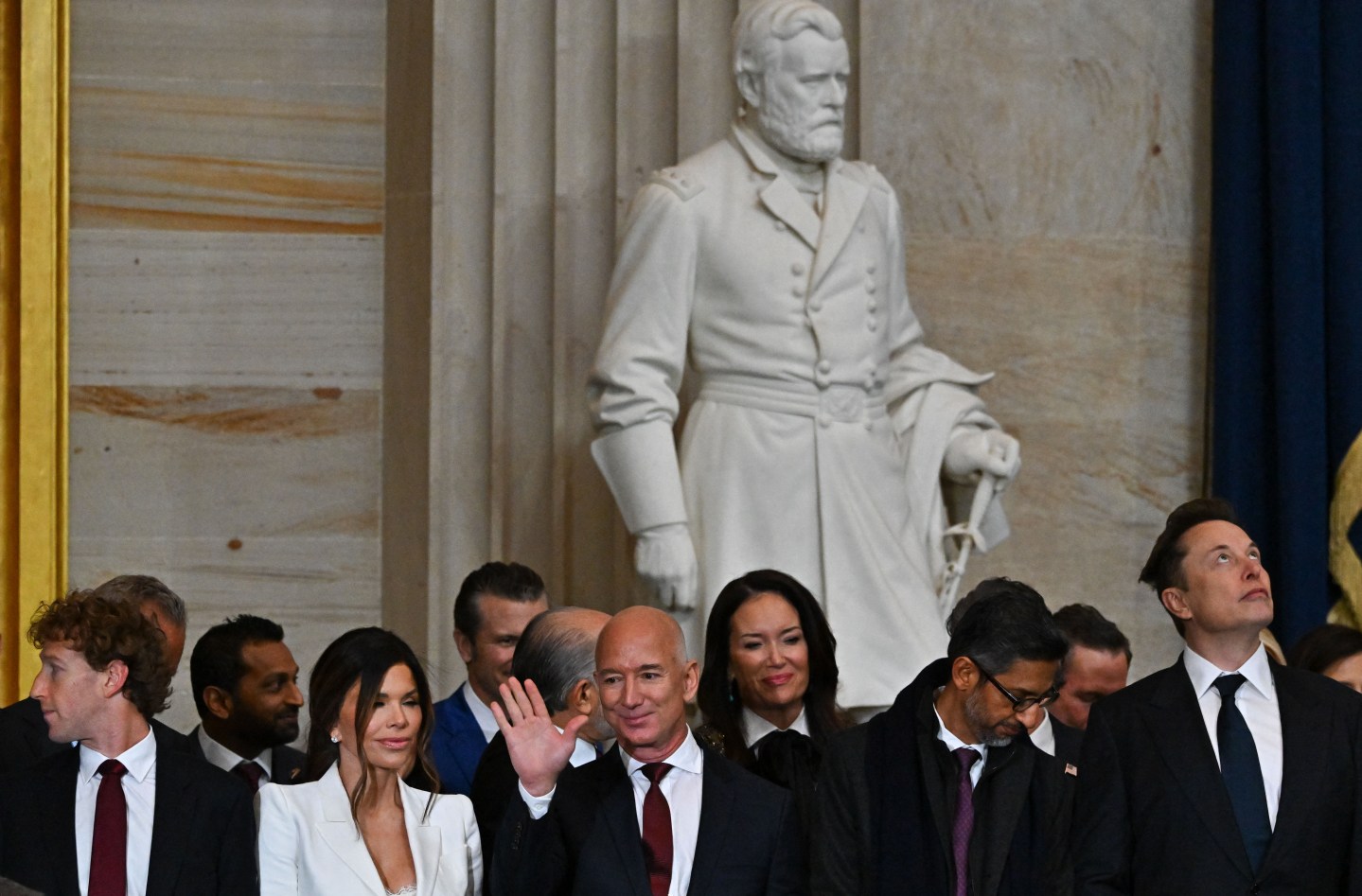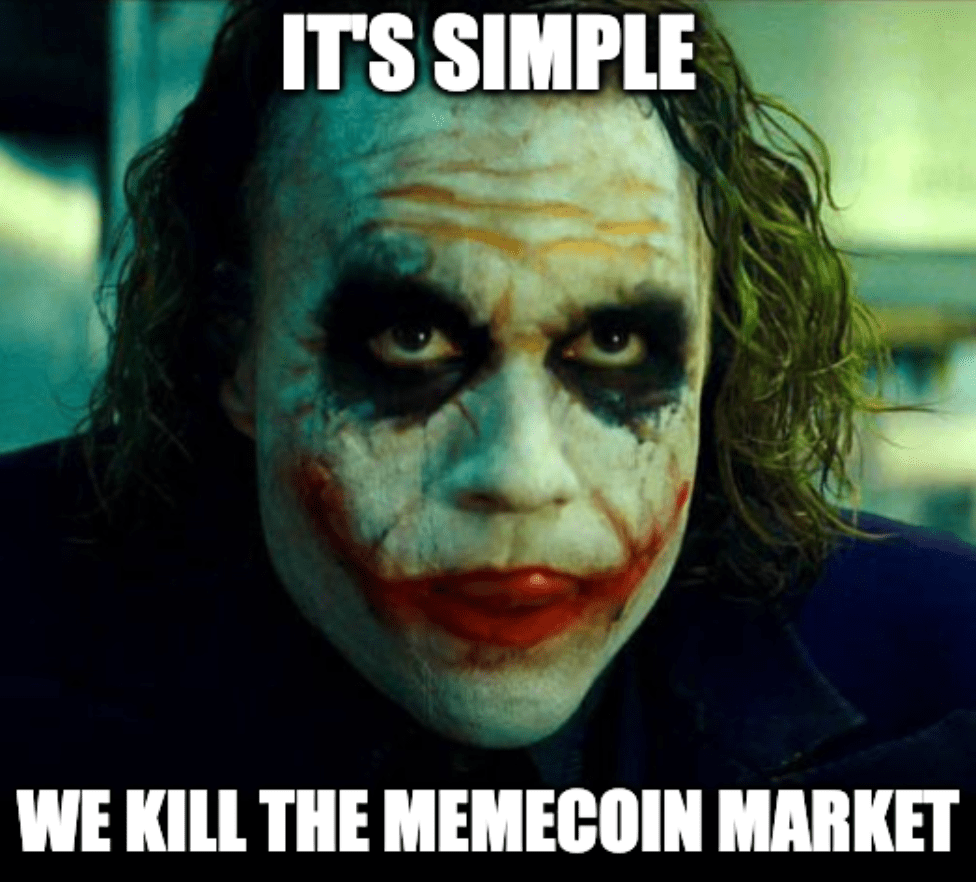Good morning. Is your head spinning from the barrage of headlines (and, um, hand gestures) out of Washington yesterday? Mine, too.
As Fortune cover star and early tech adopter Gordon Gekko once said: “Money is not the prime asset in life. Time is.” So let’s get right to it. —Andrew Nusca
Want to send thoughts or suggestions to Data Sheet? Drop a line here.
Trump presidency begins with flood of executive orders

The second Donald Trump presidency is officially underway, and Beltway insiders have joined their Silicon Valley counterparts in trying to determine what it will all mean for the tech industry. Here’s a look at some of the tech-related things that have happened…so far.
Trump revoked Biden’s 2023 executive order on AI risk. The mandate required developers of AI systems that pose risks to national security, the economy, or public health and safety to share the results of safety tests with the federal government before release to the public.
Trump signed an order to “immediately stop all government censorship” of social media. The rule threatens efforts to curb misinformation and disinformation and creates some legal uncertainty for government officials who might communicate with private tech companies about things like elections, natural disasters, or public health.
Trump signed an order to pause the TikTok ban for more than two months. “I am instructing the Attorney General not to take any action to enforce the Act,” it reads, to allow the Trump administration “to determine the appropriate course.” (Reminder: A President’s executive order cannot change an act of Congress.)
Trump signed an order declaring a “national energy emergency.” His related remarks were focused on fossil fuels (which the U.S. is not short on), but there is a sense that Trump could use emergency authorities to accelerate the opening of new power plants or keep open facilities that had been scheduled to close in the context of growing electricity demand for AI data centers.
Trump revoked Biden’s 2021 order on EV production. The original mandate set a nonbinding target that half of all new vehicles sold in 2030 would be electric and was supported by leading automakers. Trump’s new order also pauses the disbursement of federal funds for EV charging infrastructure.
And finally: Trump signed an order that recasts the U.S. Digital Service as the U.S. DOGE Service. More of a restructure of a 20-person, Obama-era department than anything else, it nonetheless formalizes an Elon Musk role in the administration. (DOGE co-lead Vivek Ramaswamy has reportedly exited in the most efficient move of all.) —AN
U.S. dronemakers see risk in working with Taiwan
American drone companies are worried that they will be again caught in the geopolitical crossfire between China, Taiwan, and the U.S. under President Trump.
A new Wall Street Journal report explains the “delicate” dance of U.S. firms who would normally rely on China, a world leader in the manufacture of small drones, for parts—if not for the simmering tensions between China and the U.S. that have sent them elsewhere to rebuild their supply chains.
Many have turned to the most logical alternative for drone components: Taiwan. But the country remains locked in an existential fight with China over its political and legal status—and Beijing hasn’t been shy lately about punishing companies with ties to the island nation.
Skydio is one such American company. Skydio used to get its batteries from China, but Beijing blacklisted it in October for selling drones to Taiwan’s National Fire Agency, forcing the company to ration customer batteries. To get back on track, Skydio approached the Taipei government, found new suppliers, and expects to replenish its stock “in the spring,” according to the Journal.
The nagging worry is that arrangements like this won’t stand, no matter how much Taiwan wants the business. If tensions escalate further—President Trump proceeds with steeper tariffs on Chinese-made goods; China imposes more sanctions on additional U.S. companies that use its batteries, motors, sensors, and rare-earth minerals, via Taiwan or anyone else—it could once again send U.S. dronemakers scrambling for supplies. —AN
TikTok drama gives boost to other Chinese companies
Whatever ultimately happens to TikTok’s legal status in the U.S., the prospect of the company’s service going offline has compelled some of its 170 million American users to download and use alternative Chinese services.
A new Bloomberg report says more than two million users signed up for Xiaohongshu, a.k.a. RedNote, in the span of two days.
That led to stock bumps for digital marketing firm Hangzhou Onechance Tech Corp.—which expects to see more business as Chinese companies step up their social media marketing in anticipation of new customers—and Yantai China Pet Foods Co., which hopes to capitalize on Americans sharing photos of their pets, an early trend.
Even Duolingo has noticed a 216% jump in users seeking Chinese (Mandarin) language learning on the app, sending its own stock up.
As Sinolink Securities analyst Zhao Zhongping put it in a recent research note: “American users have great consumption potential.” —AN
More data
—Broadcom CEO Hock Tan says he’d consider more deals in either chips or software.
—Meta tries to poach TikTok creators. Five-figure bonuses to post to Instagram first.
—Ford BlueCruise investigation deepens. U.S. investigators expand probe of automaker’s hands-free driving tech.
—Canoo files for bankruptcy. The Texas EV startup enters Chapter 7 liquidation.
—DeepSeek R1-Zero AI model impresses. Reasoning capability on par with OpenAI’s o1, it says.
—4 of 5 predicted trillionaires hail from tech. Bezos, Huang, Musk, Zuckerberg expected to be the first to hit the wealth milestone, per Oxfam.
—Dating apps lose their luster. Generation Z ditches Bumble, Hinge, Tinder for—gasp—IRL interactions.













